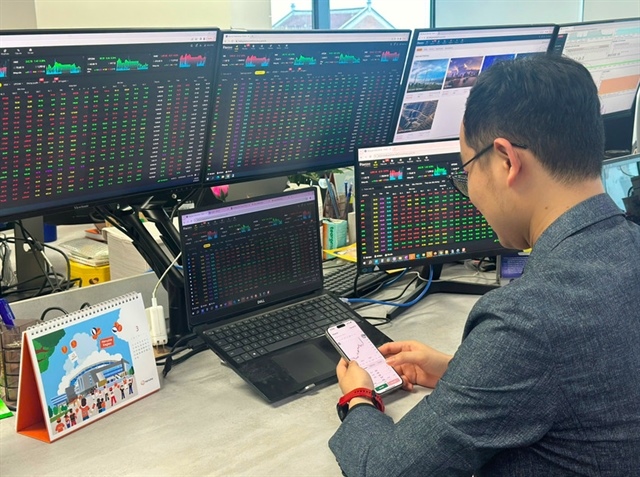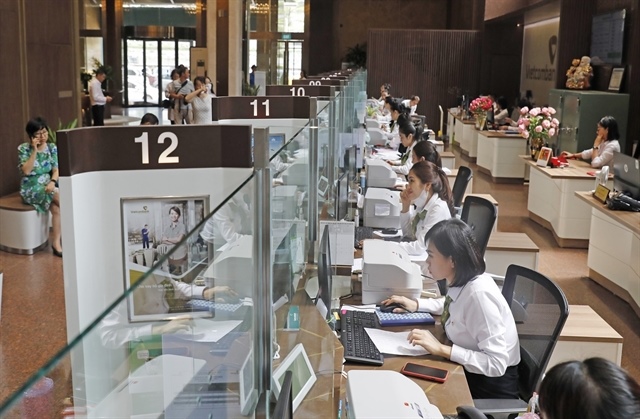Investors are selling, does that indicate capital reversal?
Investors are selling, does that indicate capital reversal?
Stock market statistics show that recently foreign investors have been net sellers, with sales reaching a total value of over VND10 trillion (US$436.6 million) from February 2018 to now, in contrast with the strong net buying in January this year.

This is one of the reasons the VN-Index has fallen sharply, erasing all gains so far this year. When foreign investors post a high net selling rate, the risk is that foreign capital may reverse, flowing backwards instead of into the economy.
If a nation experiences foreign capital outflow on a large and prolonged scale—not just for a short period—the nation must be prepared to face consequences such as exchange rate increases as the domestic currency depreciates, inflation hikes and banks receiving fewer deposits and therefore having to cut lending. These factors can lead to reduced investment and lower real gross domestic product (GDP) growth. The ability of governments and businesses to repay international loans can also become more difficult, since when the domestic currency falls they will have to spend more of it to repay loans issued in a foreign currency.
In Viet Nam’s case, the net selling of foreign investors is reflected in the statistics. But the net selling alone is not necessarily an indicator that foreign capital reversal has occurred, or that, more seriously, the country is bleeding foreign currency. A number of countervailing factors indicate that foreign capital reversal is not in fact underway.
According to data from the Foreign Investment Agency (FIA) under the Ministry of Planning and Investment, foreign indirect investment (FII) reached $1.89 billion in the first quarter of this year, a year-on-year increase of 121.6 per cent. If foreign capital flight were occurring, it would have had to begun recently and on a massive scale in order to cancel out the large quantity of first-quarter FII.
Additionally, although foreign investors have been net sellers since February, the value of the capital from this net selling is not necessarily transferred into a foreign currency, nor is it necessarily transferred abroad. It is possible that foreign investors still hold a portion of their capital from this net selling in Vietnamese bank accounts, in Viet Nam dong (for example, while waiting for new investment opportunities). Therefore, the net sale of foreign investors generally has not caused a reversal of foreign capital in Viet Nam recently.
Of course, it cannot be ruled out that some foreign investors have converted the collected capital into a foreign currency and transferred it abroad. But if this happens at a considerable scale then it will be reflected in the third factor, the exchange rate. In fact, the VND/USD exchange rate only increased significantly in late March, but softened after that, and only "broke out" from the middle of last week, up by about 90 Viet Nam dong as of May 29. Thus, the exchange rate is considered to have risen sharply, it has still only risen 0.85 per cent from the beginning of the year.
It may be argued that the exchange rate quoted by the banks (and the central rate of the State Bank) does not accurately reflect the situation of foreign currency tension in Viet Nam and therefore cannot be used to deny the possibility of a reversal of foreign currency. However, the movement of the VND/USD exchange rate on the free market, which is not too different from the commercial banks’ listed rates, also shows that there is no tension in US dollar supply and demand in Viet Nam up to now.
It is also suggested that the foreign-capital reversal from FII has been "masked" by the continued influx of foreign direct investment (FDI). Therefore, in this respect, Viet Nam has been "lucky" to avoid the consequences of bleeding foreign currency. It is possible that this offset effect is underway, but the main explanation lies in the intrinsic differences between FDI and FII, as FDI is long-run capital, not subject to short-run fluctuations like FII. Finally, in terms of macroeconomic stability, FDI and FII are not as important as the stability of foreign currency quantities in Viet Nam, which is currently strong.




























